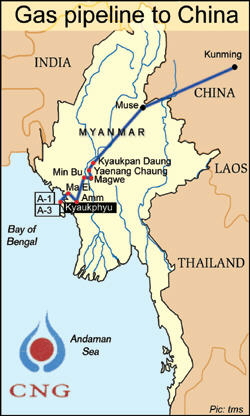Petitions were submitted by the Shwe Gas Movement and its solidarity networks at Chinese Embassies in Thailand, India, Japan, South Korea, the Philippines, Malaysia, Australia, Sweden, Norway, the Netherlands and the UK.
State-owned the People´s Republic of China National Petroleum Corporation holds a majority stake in the construction of dual oil and gas pipelines which will transfer oil shipped from the Middle East and Africa as well as natural gas from the Shwe Gas fields in western Burma to China’s Yunnan Province. The project will provide the military junta a minimum of 29 billion US dollars over 30 years.
 Abuses are already starting to surface in the project area, including beatings of fishermen and fishing prohibitions in the offshore drilling area as well as confiscation of land at the start of the pipeline in Arakan State.
Abuses are already starting to surface in the project area, including beatings of fishermen and fishing prohibitions in the offshore drilling area as well as confiscation of land at the start of the pipeline in Arakan State.
Burma ranks tenth in the world in terms of natural gas reserves yet its per capita electricity consumption is less than 5% of neighbouring Thailand and the People´s Republic of China, as it exports most of its energy resources. Increased fuel prices led to country-wide demonstrations in 2007, which were cracked down upon by the Burma Army.
“Land confiscation and other human rights abuses in the pipeline corridor and exporting the oil and gas while people across the country is facing energy shortages is a dangerous mix that will cause social unrest and conflicts between local people and foreign corporations, says Wong Aung, International Coordinator of Shwe Gas Movement.
Unresolved conflicts between the Burma regime and ethnic ceasefire armies along the planned pipeline route in northern Shan State led to a military offensive by the Burma Army in August forcing over thirty thousand ethnic Kokang to escape to the People´s Republic of China.
Original story: here.


